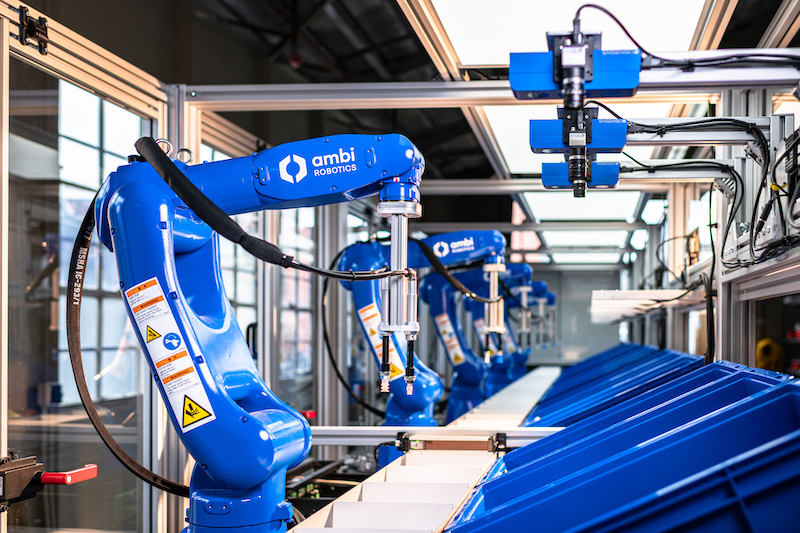Ambi Robotics secures $32M infusion to deploy its item-sorting robots in warehouses
Ambi Robotics, a startup developing supply chain automation hardware, today announced that it raised $32 million in additional funding led by Tiger Global and Bow Capital, with participation from Ahren and logistics firm Pitney Bowes. Pitney Bowes is a strategic investor in Ambi, having recently inked a $23 million deal with the company to deploy Ambi’s hardware in U.S.-based Pitney Bowes fulfillment centers.
The new capital came in the form of a SAFE, or simple agreement for future equity, which grants investors the right to purchase equity in the company at a future date, allowing Ambi to delay negotiations around valuation and terms of investment. CEO Jim Liefer says that it’ll be put toward continuing deployments and installations of Ambi’s tech, expanding the company’s product portfolio and growing engineering, customer support and operations teams headcount.
“This additional funding round came together very quickly, spawning from a ‘normal’ company update to our existing investors and partners,” Liefer told TechCrunch in an email interview. “It sparked interest to further fuel manufacturing and deployments of our current and future categories of AI-powered parcel sorting systems … Just this year, our team has more than doubled and we will continue to add engineering and customer success talent and other areas to keep pace with customer demand for our robotic solutions across their operations.”
The co-founders of Ambi — including Ken Goldberg, the chair of the industrial engineering and operations research department at UC Berkeley — years ago discovered clever techniques to train robots in simulation and transfer those learnings to the real world. After a breakthrough on a system called Dex-Net, Goldberg and Jeff Mahler, a former doctoral student, launched the company in 2019, along with other scientists and engineers from UC Berkeley.
Dex-Net, short for Dexterity Network, is an AI system that trains on thousands of images of 3D models of objects. Using deep learning, the system scans the data and uses algorithms to learn the best way to pick up the objects.

A row of Ambi’s autonomous item-sorting robotic arms deployed to a warehouse floor. Image Credits: Ambi Robotics
Ambi’s robotics platform builds on this to automate processes primarily in logistics and fulfillment. The company claims its products, which include robotic arms and the software to run them, can be “taught” to pick and pack millions of unique items while adapting to different packaging (e.g. boxes and envelopes) on the fly.
Using “end effectors” like suction cups, Ambi machines pick, scan, insert, place and pack items arranged in mail sacks on fulfillment center floors in tandem with workers. Software running in the background analyzes data on productivity, item dimensions and weights, utilization and more and identifies “pick points” on items in cluttered environments like conveyor belts, totes and bins.
Customers pay upfront for Ambi’s robotics units and then pay a monthly subscription cost for use of the software.
“The team at Ambi Robotics brings a new way of thinking about traditional problems,” Liefer said. “With advanced tech that can solve a wide range of real-world problems, the team [has] decided to use their expertise to drive the exploding ecommerce industry toward a sustainable supply chain, so the strain of sorting parcels doesn’t rest on the shoulders of our most valuable asset — people.”
Liefer says that Ambi’s current focus is deploying the latest generation of its robotics tech, AmbiSort A-Series v3, which features a “soft-touch” end effector that can handle both deformable and rigid items. Ambi claims that warehouse associates can work alongside three to four of these systems to increase the average throughput per employee to over 1,200 items sorted per hour.
Ambi competes with Covariant, Nomagic, Soft Robotics, Pickle, Hai Robotics, XYZ Robotics and RightHand, among others, in a favorable investment climate for robotics. According to Crunchbase, more than $17 billion poured into VC-backed robotic startups in 2021 — nearly triple the investment in 2020. In April, Amazon announced that it would create a new $1 billion fund to back companies working in the customer fulfillment, logistics and supply chain sectors. And in May, Walmart expanded its partnership with robotics startup Symbotic to install the latter’s machines into all of Walmart’s distribution centers in the U.S.
As of 2019, the global warehouse automation market was worth about $15 billion, according to Statista. That number is expected to double within the next four years, with supply chain executives in an Accenture survey citing automation as one of their top three investment priorities — workers’ concerns about the tech aside.
Leifer says that Ambi, for its part, began generating revenue through commercial deployments in October 2020, installing systems prior to the peak holiday buying season. The company is currently in the process of installing 80 parcel-sorting systems while supporting more than 80 “full-stack” sorting systems across 15 sorting hubs.
Gregg Zegras, EVP and president of global e-commerce at Pitney Bowes, added in an emailed statement: “Ambi Robotics is an important part of an innovation strategy that is helping Pitney Bowes improve service to our clients and efficiently grow our global ecommerce business. In Ambi Robotics, we see the same commitment to client-led innovation that has helped Pitney Bowes evolve and win in the marketplace for over 100 years. We look forward to continuing to work together to drive innovation in our global ecommerce hubs.”
Berkeley-based Ambi, which recently moved into a new HQ, has raised $67 million to date and has more than 50 employees.
Ambi Robotics secures $32M infusion to deploy its item-sorting robots in warehouses by Kyle Wiggers originally published on TechCrunch
from TechCrunch https://ift.tt/Y0neoTf
Comments
Post a Comment